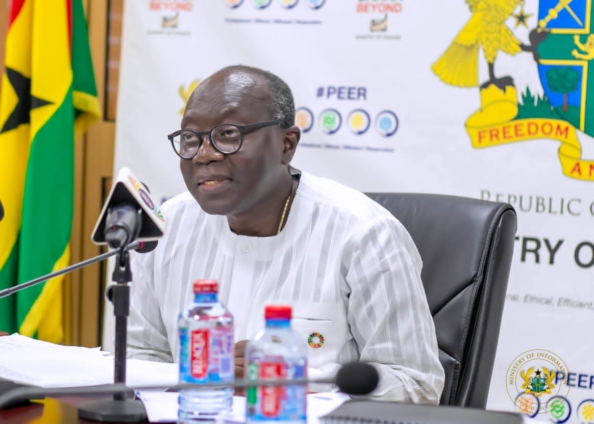Finance Minister, Ken Ofori-Atta has pointed out that the 2023 Budget is anchored on a seven-point agenda aimed at restoring macro-economic stability and accelerating Ghana’s economic transformation as articulated in the Post-COVID-19 Programme for Economic Growth (PC-PEG).
These comprise an agenda to aggressively mobilize domestic revenue, streamline and rationalise expenditures, boost local productive capacity, promote and diversify exports, protect the poor and vulnerable, expand digital and climate-responsive physical infrastructure and implement structural and public sector reforms.
To achieve these, Mr. Ofori-Atta said there are three critical imperatives which are; successfully negotiating a strong International Monetary Fund programme, coordinating an equitable debt operation programme; and attracting significant green investments.
“This will enable us to generate substantial revenue, create needed fiscal space for the provision of essential public services and facilitate the implementation of the PC-PEG programme to revitalise and transform the economy”, he stressed.
“We will undertake the following actions, initiatives, and interventions under the seven-point agenda”, Mr. Ofori-Atta added.
To aggressively mobilize domestic revenue, the Finance Minister said the VAT rate has been increased by 2.5% to directly support roads and digitalization agenda, the fast-tracking of the implementation of the Unified Property Rate Platform programme in 2023 and the review of the Electronic Transaction Levy Act and more specifically, reduce the headline rate from 1.5% to one percent 1% of the transaction value as well as the removal of the daily threshold.
To boost local productive capacity, Mr. Ofori-Atta said government will among others cut the imports of public sector institutions that rely on imports either for inputs or consumption by 50% and will work with the Ghana Audit Service and the Internal Audit Agency to ensure compliance, and others.
To promote exports, he disclosed that government will among others expand productive capacity in the real sector of the economy and actively encourage the consumption of locally produced rice, poultry,
vegetable oil and fruit juices, ceramic tiles among others.
To pursue efficiency in government expenditures, he said government will among others implement the Government directives on expenditure measures.
Latest Stories
-
IPR Ghana congratulates citizens for peaceful election, calls for unity
6 minutes -
Bawumia’s 8 minutes elite ball that zapped the energy of trigger happy politicians
55 minutes -
It will be a betrayal if National Cathedral saga does not feature in ORAL’s work – Ablakwa
1 hour -
‘It’s unfortunate we had to protect the public purse from Akufo-Addo’ – Ablakwa on ORAL Team’s mission
2 hours -
Congo lawyers say Apple’s supply chain statement must be verified
2 hours -
Stampede in southwestern Nigerian city causes multiple deaths
3 hours -
Tens of thousands without water in Mayotte as curfew brought in
3 hours -
ORAL: We won’t witch-hunt, we’ll focus on transparency, not revenge – Ablakwa
3 hours -
Attempted robbery: Accused claims he carried cutlass for protection
3 hours -
Excavator operator jailed for stealing
4 hours -
African fans age-shame me for putting on some outfits – Tiwa Savage
4 hours -
Tiwa Savage criticised by female fans for stance on cheating in relationships
4 hours -
Bank of England expected to hold interest rates
4 hours -
Congo river boat sinks killing at least 22
5 hours -
Nigeria approves Shell’s $2.4 billion asset sale to Renaissance
5 hours

